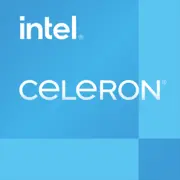Intel Celeron 1000M

Intel Celeron 1000M in 2025: Is It Worth Buying a Laptop with This Processor?
Introduction
The Intel Celeron 1000M processor, released in 2013, is still found in budget laptops, especially in developing countries. Despite its age, such devices continue to be sold as new for prices ranging from $250 to $350. But how relevant is it in 2025? Let's take a closer look.
1. Architecture and Process: An Outdated Base
The Celeron 1000M belongs to the Ivy Bridge generation (3rd generation Intel Core) and is manufactured using a 22nm process. It is a dual-core processor without Hyper-Threading support (2 threads), with a base frequency of 1.8 GHz and no turbo mode. The L3 cache is only 2 MB, which is half of what modern budget chips offer.
Integrated Graphics — Intel HD (Ivy Bridge generation) with a base frequency of 650 MHz. It supports DirectX 11 but has only 6 execution units (EU). In comparison, modern Intel UHD Graphics (such as in the Pentium Gold 8505) come with 48 EUs and support DirectX 12.
Example: Running YouTube at 1080p is possible, but 4K playback may experience stutters. Games like Minecraft (2011) on low settings will run at 20-25 FPS.
2. Power Consumption and TDP: High Price for Modest Power
The processor's TDP is 35 W, which is considered high in 2025. Modern budget chips (such as the Intel N100) have a TDP of 6-15 W while providing similar or greater performance. High thermal output requires active cooling, which increases the laptop's thickness and noise level.
Advice: Laptops with Celeron 1000M often come with small fans that quickly become clogged with dust. Regular cleaning of the cooling system is essential.
3. Performance: Bare Minimum for Survival
- Office Work: Word documents, Excel, and a browser with 5-7 tabs are manageable, but expect delays when switching between applications.
- Multimedia: Watching Full HD videos is fine, but photo editing in Lightroom or video editing is impossible.
- Gaming: Only older games (Half-Life 2, The Sims 3) or 2D projects (Stardew Valley) are playable. Modern esports titles (such as Valorant) will deliver less than 15 FPS even at low settings.
Turbo Boost mode is absent — the frequency is fixed at 1.8 GHz, limiting peak performance.
4. Use Cases: Who Is It Suitable For?
- Students for typing and working with PDFs.
- Senior users who need a simple device for Zoom calls and reading news.
- Cashiers or warehouse staff for working with 1C and basic ERP systems.
Important: Do not consider this processor for tasks that require multitasking (e.g., streaming music + working in a browser + having an open messenger).
5. Battery Life: Don’t Expect Miracles
Laptops with Celeron 1000M are equipped with batteries of 30-40 Wh. With a TDP of 35 W and the absence of advanced power-saving technologies (besides basic SpeedStep), battery life rarely exceeds 3-4 hours under moderate load. In comparison, modern devices with Intel N100 provide 8-10 hours.
Advice: Disable Wi-Fi and reduce screen brightness to 50% to extend battery life by 1-1.5 hours.
6. Comparison with Competitors
- Intel Pentium Gold 8505 (2023): 5nm process, 5 cores (1 Performance + 4 Efficient), 8 threads, TDP 15 W. Performance in Geekbench 6: 1800 (Single), 4500 (Multi). Laptop prices start from $400.
- AMD Athlon Silver 7120U (2023): 6nm, 2 cores/2 threads, Radeon 610M graphics. Better at handling multithreaded tasks due to Zen 2 architecture. Device prices start from $350.
- Apple M1 (2020): Not a direct competitor, but in 2025, used MacBook Air M1s sell for $500-600, offering 5-7 times higher performance.
Conclusion: The Celeron 1000M lags behind even budget models from 2023-2024.
7. Pros and Cons
Pros:
- Extremely low laptop prices (from $250).
- Sufficient for basic tasks.
- Repairability (often uses standard HDDs and DDR3 RAM).
Cons:
- No support for Windows 11 (only Windows 10 or Linux).
- Weak graphics.
- High power consumption.
8. Recommendations for Choosing a Laptop
- Type of Device: Budget plastic laptops with 15.6" screens and a resolution of 1366×768 pixels. Models with HDDs are common, but it’s better to look for options with SSDs (even 128 GB).
- What to Look For:
- RAM: At least 4 GB, but preferably 8 GB (DDR3).
- Ports: Check for USB 3.0 and HDMI for connecting external devices.
- Screen: Avoid TN panel models — choose IPS for better viewing angles.
Examples of 2025 Models:
- Dell Inspiron 15 3520 Celeron — $279, 4 GB RAM, 128 GB SSD.
- HP 15-dw3000 Celeron — $299, 8 GB RAM, 256 GB SSD.
9. Final Conclusion: Who Is the Celeron 1000M Suitable For?
This processor is a choice for those who critically need a budget under $300 and are willing to accept limitations:
- Suitable for: Browsing websites, working with documents, simple video chats.
- Not suitable for: Gaming, video editing, running multiple applications simultaneously.
Key Benefit: Price. If you need a "typewriter with a screen" for trips to the dacha or as a backup device, the Celeron 1000M will suffice. However, for daily use in 2025, it's better to pay an extra $100-150 and get a laptop with an Intel N100 or AMD Athlon Silver.
Basic
CPU Specifications
Memory Specifications
GPU Specifications
Benchmarks
Compared to Other CPU
Share in social media
Or Link To Us
<a href="https://cputronic.com/en/cpu/intel-celeron-1000m" target="_blank">Intel Celeron 1000M</a>